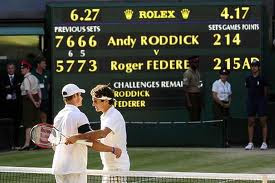A famous football coach once said, “In my 20 years of coaching, I never lost a single game- I just ran out of time.” (If we had more time, we’d be able to catch up, or the opposing team would get tired or commit mistakes; Nevertheless, it does not count since the rules say how much time we have in the game.) More often than not, time is a rule that everyone needs to contend with in the many games of life.
But time is not the only rule. Each game has a different set. Knowing these, and knowing what is important to score, and distinguishing which are nice but don’t add value is something that winners always do.
In tennis, one or two points can mean the difference between a Grand Slam title and obscurity. Games can be decided by an inch or less. The scoring system is far from perfect but it is the system that prevents chaos and makes sense of it all.
In the business world, the rules and the score are determined by the target market. Doing research to understand what the customer thinks is an important part of the value creation, communication and delivery process.
In my marketing management class, I remind my students to always play by the score- and be effective (achieve the objective as defined by the rules on scoring) and efficient (achieving effectiveness with the least amount of effort). Of course, life is never that simple and fair…
In the real world, freestyle or the no-rules attitude may be the norm. But for graduate school studies, students have to be reminded that because learning outcomes have to be graded, there are certain criteria and points that students must know and score against. Using templates, being mindful of rubrics and deadlines can spell the difference between gold and silver, excellence and being average.
Read more: Play By the Rules. Play to Win.

